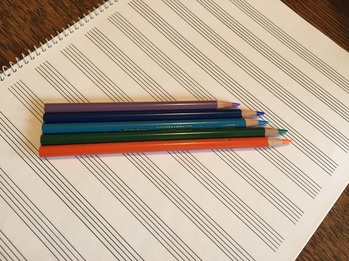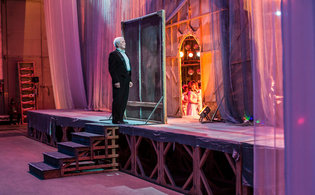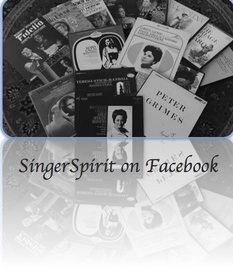The Singer's Spirit
Menu
 One question I’m often asked by non-singers is, “what is the difference between a mezzo and soprano?” A simple question, that sometimes even for singers isn’t all that simple. The questioner often assumes it’s only a matter of the range. “A soprano can sing higher than a mezzo, right?” Well, not necessarily. Many mezzos, in fact most I know, have no trouble singing a high C. So, I usually answer something like: “It’s really not a matter of range so much, but how much of the time you stay in each part of the range.” Then, I try to add some explanation of the concept of tessitura, at which time the questioner’s eyes glaze over and the subject is conveniently changed to something other than singing. Tessitura, from the Italian word meaning texture, is defined as the range in which most of a certain piece of music lies. A piece written for soprano may have the exact same range of notes as one written for mezzo, but it will have a higher tessitura. This photo of pencils provides a visual for the concept. I recently studied a soprano role in its entirety, and decided to use different colors to highlight different parts of the range, with the highest notes going to violet end of the spectrum, and the lowest notes going to the red end of the spectrum. (I left out the yellow and red pencils from this photo, because I use those pencils for general highlights, and correcting.) What you see here is orange, green, blue, indigo and violet. And voila! The violet is the shortest, because I used it the most for the highest part of the range. The pencils get longer, the lower you go on my voice “spectrum,” which reflects the fact that the role has fewer notes in those ranges. Singers use language like, “lies in the upper register,” “remains longer above the upper passagio,” or, referring to the page, “frequently stays above the staff.” Put simply, the soprano role I highlighted stayed mostly in the higher range, with an even gradation downwards. But even within voice types, there is variation of tessituras, and I’m sure some sopranoroleswould have the indigo predominating. I haven’t tried my highlighting technique on a mezzo role, and my guess is that it wouldn’t be an inverse of this, but more likely the green winning out. Any mezzos out there who want to give it a try, please let me know what you find. FYI, I found this exercise extremely helpful, refining my approach to different parts of the voice. Like most lovers of Broadway musicals, I was introduced to the word Tessitura from the lyrics of the great Stephen Sondheim. In the song, “You Gotta Get a Gimmick,” a stripper named Tessie (short for Tessitura) sings, Dressie Tessie Tura Is so much demurer Than all the other ladies because… You gotta get a gimmick If you wanna get applause! You might not need a gimmick, but you do need to understand which music best suits your voice, and that of your students, and Tessitura is one of the largest determinants of voice type, (though not the only one). Next time you’re looking for a way to explain the concept, assuming you don’t have a copy of my wonderful pencil photo handy, maybe modify the old saying: For a mezzo, a high C is a nice place to visit, but she wouldn’t want to live there. Here’s the song from Gypsy, with the fabulous Bernadette Peters et al. Gotta Get A Gimmick!
0 Comments
 This is a wonderful photo and article from today's New York Times. In this performance, one of the violinists was conducting, as all the company's conductors, and many others, have fled because of the violence. http://www.nytimes.com/2015/02/05/world/europe/cultural-life-goes-on-in-donetsk-war-permitting.html?ref=todayspaper&_r=0 It reminds me of the quote from Leonard Bernstein that many of us know, the one that begins, "This will be our reply to violence..." Here is a longer excerpt of that famous quotation, which was offered at a memorial concert given on November 24th, 1963, organized by Bernstein to honor his friend, John F. Kennedy, who had been assassinated just two days before. "We musicians, like everyone else, are numb with sorrow at this murder, and with rage at the senselessness of the crime. But this sorrow and rage will not inflame us to seek retribution; rather they will inflame our art. Our music will never again be quite the same. This will be our reply to violence: to make music more intensely, more beautifully, more devotedly than ever before. And with each note we will honor the spirit of John Kennedy, commemorate his courage, and reaffirm his faith in the Triumph of the Mind." Let's keep singing, and by all means, send our thoughts and prayers to our colleagues in Ukraine. b. July 7, 1937 in Leningrad (now St. Petersburg.) d. January 13, 2015 in Germany, where she was receiving medical treatment after a long illness. Ms. Obraztsova sang and was admired the world over, for her Amneris, Dalila, and numerous other roles, including the Russian repertoire and contemporary works. In later years, she taught and served as Artistic Director for the Mikhailovsky Theater in St. Petersburg. She debuted in 1963 as Marina at the Bol'shoy, while still a student at the Leningrad Conservatory. Happy Birthday Jacob Ludwig Carl Grimm, born January 4, 1785.
Where would opera be without the fairy tales collected by him and his brother Wilhelm? Grimm was also an important scholar of linguistics, and he and his brother spent their lives studying and writing about legends, folklore, and language. Both were active in political protests against the monarchy’s breech of constitutional principles, for which they were fired from the University of Göttingen around 1841. They were offered numerous other positions and ended up at the University of Berlin, though eventually resigned to devote themselves to their own scholarly and literary work. Jacob died in 1863, Wilhelm in 1859. Here are two great singers, Edita Gruberova and Brigitte Fassbaender, in Humperdinck's opera: Video Link: Hänsel and Gretel Duet Cinterella, in German is Aschenputtel, in italian… Cenerentola! Here's one of my all-time favorite singers, mezzo soprano Teresa Berganza, singing the finale from Rossini's opera: Video Link: Non più mesta Singer’s Wisdom 2014
I’ve interviewed some terrific singers and musicians this year. Here’s a small sampling of what they had to say. “The audience members that I’ve talked to take different things from different performances. Is it cancer research? No. But Strauss called it ‘Heilige Kunst.’ It does feel holy, in a way, because it touches things that make us unique in the universe and it touches emotional buttons. Music in itself causes us to respond emotionally first. They’ve documented this. They’ve watched brain scans and I think that’s a special thing. I think there’s more to it than we know. Also the Greeks believed there was something very holy in the overtone sequence and I think there is something to that. There’s nothing that we can quantify but I think every performer will tell you that you can feel the audience with you, as much as you’re giving to them, and there’s no way to document that. That’s sharing. That’s being communal. Being in one place for one purpose and there’s something very beautiful about that, very human. And that we’re not using microphones to do that. When I’m singing and when the orchestra is playing, those vibrations are touching everyone in the theater. It’s a very special thing. When I talk about this, I don’t take this lightly. Nor do I exalt myself for doing it.” –Greer Grimsley * * * “Talk to each other! About technique, discuss it. I think one of the dangers when we’re in colleges, behind closed doors, the studios get their cults and these students would never talk to the students in that studio because it’s like revealing state secrets. Well that’s hogwash, kids, I hate to tell you. I’m happy to teach in front of anybody.” –Sheri Greenawald * * * “This is a kind of European art form and it really needs manners. It makes it nice for everybody who is under such stress all the time. I learned from a wonderful tenor, Charlie Anthony. He paid every single person a compliment every day. He always said something nice to me. ‘Hey, I like your shoes,’ or ‘you got a nice haircut.’ Something nice. And it just relaxes the temperature. Somebody saying to the pianist, ‘hey, you really play great.’ Everybody needs that in the theatre. It was such precious information to me. It’s a very intimate world.” –Joan Dornemann * * * “Listen, it’s not just the throat. It’s the whole body. Especially when you’re singing Wagner, we engage every muscle, every fiber, every chakra, every spiritual portal that you have when you are putting on a piece of music like that, is engaged.” –Jay Hunter Morris * * * “I got into this because I had a voice, but then I realized that wasn’t enough and I could be an artist. It’s really about having the artistic mindset of thinking and reflecting upon things instead of just doing. That’s one of the most interesting and valuable things that we as artists can give. I hope that an audience comes and thinks, “nice voice,” but (also) that when they see me enjoying and reminiscing with Mimi, that that reminds them, “don’t let your life slip through your fingers. You are going to lose loved ones. Cherish the moments that you have.” –Bryan Hymel * * * (On working with Messiaen.) “Allors, I will tell you, immediately, the first thing is he was always able to change and adapt. Luciano Berio was the same. You would say, ‘Luciano, this part it’s really too slow, or it’s too fast’ and he would say, ‘oh, you think so? Let’s change it.’ They’re always ready and it’s only after the death of the composer that the people who think they keep the moral right, are imposing things where, in fact, it would not have been the case had the composer been alive.” –Katia LaBèque * * * “I personally feel that the tempo should be free and I don’t think that just about Bach. I think that about most composers, actually. But certainly in his music, I think that the interesting thing about the pulse is that sometimes the sort of inner pulse of the music can be very large beats and within that, there’s quite a lot of flexibility. So you could even be thinking one measure at a time in terms of a pulse and within that measure there might be quite a variety of tempi. So, I think that that’s how the music breathes and if you’re singing and if you’re just…human, there isn’t really rigidity to tempo, there should be a feeling of ebb and flow.” –Simone Dinnerstein * * * “Everybody forgets, opera in America is not that old. Musicals are not that old, and I think of them as our opera. The popularity of them is like what Puccini and Verdi did. And it’s never going to be like that again because of TV and the internet. But like I said, it’s not just trying to keep opera going. It’s about keeping live theater going, because that experience can’t be replicated in any other situation.” –Francesca Zambello * * * “Our dialogue has shifted over the years and our student/teacher relationship has changed. It’s not stayed stagnant…She is the eternal student herself. She’s constantly reading, going to other people’s master class to improve her own technique, so that’s interesting for me to have a constantly evolving toolbag. When I have a lesson with her I always walk in singing one way and walk out singing healthier, clearer. So until that changes I intend to stay with her. It’s also nice to work with somebody who knows my instrument so intimately. She has known it since I was eighteen. It’s been a great relationship and one that I hope will continue for a long time.” –Susanna Phillips of her relationship with her teacher, Cynthia Hoffman * * * “I think it’s a work in progress, to be quite honest. I think I’m going to always suffer from this thing, I don’t know where it comes from, but I just feel inferior in general. I’m starting to believe in myself and it’s having a huge impact on the way I am performing onstage. Believing in yourself gives you the courage to believe in your instrument and believing in your instrument gives you control over your technique, which in some bizarre way gives you the freedom you desire onstage.” –Elza van den Heever * * * “For me, classical singing has a lot in common with sports. If it’s traditional repertoire, the audience knows when difficult moments are coming up and they’re kind of listening to see if you make it, in the same way an audience waits to see if a skater lands a jump, for instance. That can really mess with your head if you let it. I always start a performance thinking, “Open your heart. Look at the audience and send them love and know that at least some of them are loving you.” It’s so easy to think that everyone is listening with a judgmental ear, but if you think that way, you’re screwed.” –Yulia van Doren * * * “I think with this job of opera singer or artist or whatever you want to call it, it’s about connecting with people and sharing experience, empathizing with your characters, and bringing out emotional situations. I think to bring that to the stage it’s important to show that off the stage. You have to nurture yourself and the environment around you. The causes I’m drawn to speak for those who can’t speak for themselves. That often is animals or the environment.” –Elizabeth DeShong Happy New Year Singers! And may your 2015 be filled with wisdom, happiness, and song! Love, Lisa |
|
©Lisa Houston 2022
